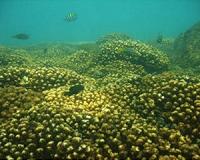| . |  |
. |
Tokyo (AFP) April 7, 2011 The discovery of radiation in seafood has hit Japan right in its culinary heart, as the nation that brought sushi to the world contemplates having to change thousand-year-old eating habits. For an archipelago that has lived off the ocean since prehistoric times, radioactive fish is a worst-case scenario with possibly economy-wide implications. "If the situation worsens we don't know what the outlook will be," a manager at a popular sushi chain told AFP, saying the number of customers was down by about a third compared with normal times. "It's very scary to think about." The March 11 earthquake and tsunami knocked out cooling systems at the Fukushima Daiichi nuclear plant, and in the nearly four weeks that have passed since, workers have been struggling to prevent atomic disaster. So far most Japanese have not been directly affected by the calamity, but the realisation that radioactive material has been found in seafood has made many of the nation's 126 million people nervous. The alarm was sounded early this week when radioactive iodine was detected in a variety of small fish known as konago, or sand lance, caught off Ibaraki, south of the plant. Fishing of the species was stopped locally, reports said. The radiation level dropped off Fukushima, but iodine-131 concentrations remained at 140,000 times the government-set limit, the plant's operator said Thursday, according to Jiji Press. Caesium levels are also a concern. According to Japan's Fisheries Agency, unsafe fish will not be sold to consumers as local fisheries cooperatives have stopped shipping them. Whether official reassurances will help is another matter, and as of Thursday business had slowed significantly in Toyko's enormous and sprawling Tsukiji fish market. "I'm in a bad mood all day, every day," a wholesaler at the market told AFP on condition of anonymity, saying that more than anything else his revenue had been hurt by harmful rumours. Those rumours are likely to proliferate because radioactive seafood is a nightmare come true for two uniquely Japanese reasons. Japan is the only country that has experienced atomic war and the long-term effects of radiation, leaving the public fearful of nuclear technologies even today, more than 65 years after Hiroshima and Nagasaki. The nation was also the scene of one of the worst public health disasters of the post-war period, with thousands crippled by mercury poisoning of seafood caused when toxic chemicals were released into the sea in the 1950s and 1960s. Naomi Haraguchi, an official at the Tokyo city government's bureau of welfare and public health, food safety division which oversees hygiene at Tsukiji said Tokyo was readying for a worsening of the situation. "Currently we have no plans to inspect the fish at Tsukiji but we are nonetheless making preparations for such plans if the situation changes," she said. As the scare develops, restaurants may have to take unprecedented steps to reassure an anxious public. "We are currently not planning to use Geiger counters but if the situation gets worse, I guess we'll have to start thinking about that," the sushi bar manager told AFP. Ultimately, he added, if the situation drags on for long, there could be permanent changes in what the Japanese eat. Fishermen used to fishing in waters off Japan's east coast could switch to the western side of the country and their catch would not be the same. "(The species you can catch) are totally different. If the situation continues, this could lead to a change in Japanese eating habits," the manager said.
Share This Article With Planet Earth
Related Links Water News - Science, Technology and Politics
 World's Reef Fishes Tussling With Human Overpopulation
World's Reef Fishes Tussling With Human OverpopulationHalifax, Canada (SPX) Apr 07, 2011 In an unprecedented collaborative analysis published in the journal PLoS Biology, scientists from 49 nations demonstrated that the ability of reef fish systems to produce goods and services to humanity increases rapidly with the number of species. However, growing human populations hamper the ability of reefs to function normally, and counterintuitively, the most diverse reef fish systems suffer ... read more |
|
| The content herein, unless otherwise known to be public domain, are Copyright 1995-2010 - SpaceDaily. AFP and UPI Wire Stories are copyright Agence France-Presse and United Press International. ESA Portal Reports are copyright European Space Agency. All NASA sourced material is public domain. Additional copyrights may apply in whole or part to other bona fide parties. Advertising does not imply endorsement,agreement or approval of any opinions, statements or information provided by SpaceDaily on any Web page published or hosted by SpaceDaily. Privacy Statement |